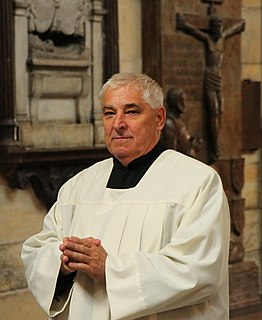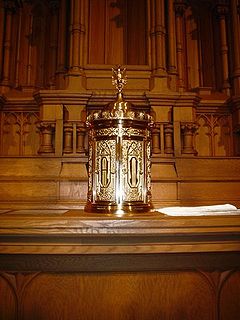
The Eucharist also known as Holy Communion and the Lord's Supper, among other names, is a Christian rite that is considered a sacrament in most churches, and as an ordinance in others. According to the New Testament, the rite was instituted by Jesus Christ during the Last Supper ; giving his disciples bread and wine during a Passover meal, he commanded them to "do this in memory of me" while referring to the bread as "my body" and the cup of wine as "the blood of my covenant, which is poured out for many".
In The Church of Jesus Christ of Latter-day Saints, the Holy Sacrament of the Lord's Supper, most often simply referred to as the sacrament, is the ordinance in which participants eat bread and drink water in remembrance of the body and blood of Jesus Christ. Normally, the sacrament is provided every Sunday as part of the sacrament meeting in each LDS Church congregation.

An altar server is a lay assistant to a member of the clergy during a Christian liturgy. An altar server attends to supporting tasks at the altar such as fetching and carrying, ringing the altar bell, helps bring up the gifts, brings up the book, among other things. If young, the server is commonly called an altar boy or altar girl. In some Christian denominations, altar servers are known as acolytes.

The Liturgy of Preparation, also Prothesis or Proskomedia, is the name given in the Eastern Orthodox Church to the act of preparing the bread and wine for the Eucharist.

Intinction is the Eucharistic practice of partly dipping the consecrated bread, or host, into the consecrated wine before consumption by the communicant.

Metousiosis is a Greek term (μετουσίωσις) that means a change of ousia.
The Council of Agde was a regional synod held in September 506 at Agatha or Agde, on the Mediterranean coast east of Narbonne, in the Septimania region of the Visigothic Kingdom, with the permission of the Visigothic King Alaric II.

During the Mass of the Faithful, the second part of the Mass, the elements of bread and wine are considered to have been changed into the veritable Body and Blood of Jesus Christ. The manner in which this occurs is referred to by the term transubstantiation, a theory of St. Thomas Aquinas, in the Roman Catholic Church. Members of the Orthodox, Anglican, and Lutheran communions also believe that Jesus Christ is really and truly present in the bread and wine, but they believe that the way in which this occurs must forever remain a sacred mystery. In many Christian churches some portion of the consecrated elements is set aside and reserved after the reception of Communion and referred to as the reserved sacrament. The reserved sacrament is usually stored in a tabernacle, a locked cabinet made of precious materials and usually located on, above, or near the high altar. In Western Christianity usually only the Host, from Latin: hostia, meaning "victim", is reserved, except where wine might be kept for the sick who cannot consume a host.

The Archdiocese of Braga is a Latin Church ecclesiastical territory or archdiocese of the Catholic Church in Portugal. It is known for its use of the Rite of Braga, a use of the liturgy distinct from the Roman Rite and other Latin liturgical rites.

Alexandrian rites are liturgical rites employed by three Oriental Orthodox churches, the Coptic Orthodox Church of Alexandria, Eritrean Orthodox Tewahedo Church, and Ethiopian Orthodox Tewahedo Church, as well as by their Eastern Catholic counterparts of the Coptic Catholic Church, Eritrean Catholic Church, and Ethiopian Catholic Church.
The region around the city of Braga, in modern Portugal, was an important centre for the spreading of Christendom in the Iberian Peninsula. This is reflected in the number of religious personalities associated with the region and the fact that many ecumenical councils were held in the city.

Eucharist here refers to Holy Communion or the Body and Blood of Christ, which is consumed during the Catholic Mass or Eucharistic Celebration. "At the Last Supper, on the night he was betrayed, our Savior instituted the Eucharistic sacrifice of his Body and Blood, ... a memorial of his death and resurrection: a sacrament of love, a sign of unity, a bond of charity, a Paschal banquet 'in which Christ is consumed, the mind is filled with grace, and a pledge of future glory is given to us.'" As such, Eucharist is "an action of thanksgiving to God" derived from "the Jewish blessings that proclaim – especially during a meal – God's works: creation, redemption, and sanctification."

The Mass is the central liturgical rite in the Catholic Church, encompassing the Liturgy of the Word and the Liturgy of the Eucharist, where the bread and wine are consecrated and become the Body and Blood of Christ. As defined by the Church at the Council of Trent, in the Mass, "the same Christ who offered himself once in a bloody manner on the altar of the cross, is present and offered in an unbloody manner". The Church describes the Mass as the "source and summit of the Christian life". Thus the Church teaches that the Mass is a sacrifice. It teaches that the sacramental bread and wine, through consecration by an ordained priest, become the sacrificial body, blood, soul, and divinity of Christ as the sacrifice on Calvary made truly present once again on the altar. The Catholic Church permits only baptised members in the state of grace to receive Christ in the Eucharist.
The Lusitanian Catholic Orthodox Church is a church denomination in Portugal claiming to be both Catholic and Eastern Orthodox but in communion with neither the Catholic Church nor the Eastern Orthodox Church.
Collections of ancient canons contain collected bodies of canon law that originated in various documents, such as papal and synodal decisions, and that can be designated by the generic term of canons.

Sacramental wine, Communion wine, or altar wine is wine obtained from grapes and intended for use in celebration of the Eucharist. It is usually consumed after sacramental bread.

Communion under both kinds in Christianity is the reception under both "species" of the Eucharist. Denominations of Christianity that hold to a doctrine of Communion under both kinds may believe that a Eucharist which does not include both bread and wine as elements of the religious ceremony is not valid, while others may consider the presence of both bread and wine as preferable, but not necessary, for the ceremony. In some traditions, grape juice may take the place of wine with alcohol content as the second element.

The Asterisk, or Star-cover, is one of the holy vessels used in the Divine Liturgy of the Eastern Orthodox, Oriental Orthodox and Eastern Catholic Churches. The asterisk symbolizes the Star of Bethlehem. Historically, it was also used in some parts of the Roman Catholic Church.
The Second Council of Braga, held in 572, presided over by Martin of Braga, was held to increase the number of bishops in Galaecia. Twelve bishops assisted at this council, and ten decrees were promulgated: (1) that the bishops should in their visitations see in what manner the priests celebrated the Holy Sacrifice and administered baptism and the other sacraments, thanking God if they found everything as it should be, and instructing the priests if they were found wanting in knowledge, and obliging all catechumens to attend instructions for twenty days before baptism and to learn the creed; (2) that the bishop must not be tyrannical towards his priests; (3-4) that no fee must be accepted for Holy orders, and the holy chrism must be distributed free; (5-6) that the bishop must not ask a fee for consecrating a church, that no church should be consecrated without the bishop being sure of the endowment of the ministers, and that no church built on private property for the purpose of emolument should receive consecration; (8) that if a cleric should accuse any one of unchastity without the evidence of two or three witnesses he should be excommunicated; (9) that the metropolitan should announce the date of Easter, and have it made known to the people after Christmas, so that they might be prepared for the beginning of Lent, when litanies were to be recited for three days; on the third day the Lenten fast should be announced after the Mass; (10) that any one saying Mass without fasting, as many did, as a result of Priscillianist tendencies, should be deprived of his office. This council was attended by the bishops of the suffragan sees of Braga, and by those of the Diocese of Lugo, and Pope Innocent III removed all doubt as to its authenticity.
In the First Council of Braga of 561, eight bishops took part, and twenty-two decrees were promulgated. In a number of canons, the council took aim directly at doctrines of Priscillianism.









